| Listing 1 - 7 of 7 |
Sort by
|
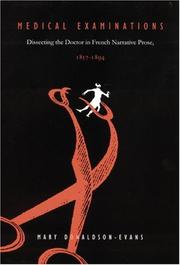
ISBN: 0803202474 9780803202474 0803266286 9780803266285 Year: 2000 Publisher: Lincoln University of Nebraska Press
Abstract | Keywords | Export | Availability | Bookmark
 Loading...
Loading...Choose an application
- Reference Manager
- EndNote
- RefWorks (Direct export to RefWorks)
Medical fiction --- Literature and medicine --- Physicians in literature. --- French fiction --- Medicine and literature --- Medicine --- History and criticism. --- History --- History and criticism
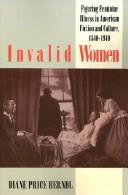
ISBN: 0807863904 0585025746 9780585025742 9780807863909 0807821039 9780807821039 0807844063 9780807844069 9798890864529 Year: 1993 Publisher: Chapel Hill University of North Carolina Press
Abstract | Keywords | Export | Availability | Bookmark
 Loading...
Loading...Choose an application
- Reference Manager
- EndNote
- RefWorks (Direct export to RefWorks)
Invalids in literature. --- Sick in literature. --- Diseases in literature. --- Women with disabilities in literature. --- Medical fiction, American --- American fiction --- Women with disabilities --- Women and literature --- Handicapped women --- Physically handicapped women --- People with disabilities --- American medical fiction --- Physically handicapped women in literature --- History and criticism. --- History. --- History --- American fiction - 19th century - History and criticism. --- Women and literature - United States - History - 19th century. --- Women and literature - United States - History - 20th century. --- American fiction - 20th century - History and criticism. --- Women with disabilities - United States - History. --- Medical fiction, American - History and criticism.
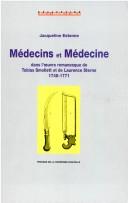
ISBN: 2878548515 2878540816 Year: 2017 Publisher: Paris : Presses Sorbonne Nouvelle,
Abstract | Keywords | Export | Availability | Bookmark
 Loading...
Loading...Choose an application
- Reference Manager
- EndNote
- RefWorks (Direct export to RefWorks)
La présente étude est née de l'observation d'une récurrence, celle du thème de la médecine dans la littérature du XVIIIe siècle, et tout particulièrement dans la production romanesque. Si ce champ de recherches a été défriché par des travaux ponctuels qui ont en quelque sorte ouvert la voie, il n'a pas, à ce jour, fait l'objet d'une exploration systématique comme celle que cette étude se propose de tenter. L'entreprise conduit naturellement à une réflexion méthodologique. Explorer la médecine d'une époque par le biais de la littérature aurait pu, il y a encore quelques décennies, passer pour de la provocation. Se confinant dans les limites d'un narcissisme étroit, la critique littéraire, sauf à se livrer à des investigations thématiques dans un esprit purement descriptif et mimétique, se refusait obstinément à solliciter l'apport constructif de l'Histoire des Idées. La vogue croissante de l'historiographie au cours des dernières années rend le dessein beaucoup moins subversif. Distincte de l'histoire traditionnelle et moins restrictive, cette discipline a pour but d'opérer une synthèse entre les différentes branches de l'histoire philosophique, religieuse, histoire des sciences et des mentalités. Par le tableau synoptique qu'elle se propose, l'historiographie met l'accent sur la relativité de l'interprétation historique.
Medicine in literature. --- English fiction --- Literature and medicine --- Medical fiction --- Physicians in literature. --- History and criticism. --- History --- Smollett, T. --- Sterne, Laurence, --- Knowledge --- Medicine. --- Characters --- Physicians. --- Medicine and literature --- Medicine --- Medical care in literature --- Sterne, Laurence --- Stʻērn, Lawrēns, --- Yorick, --- Stern, Lourens, --- Stern, Lorens, --- Стерн, Лоренс, --- Στερν, Λωρενς, --- Iorik, --- Sterne, --- Sŭtʻŏn, Lorensŭ, --- Smollet, T. --- Smollett, Tobias George, --- Smollett, Tobias, --- Author of Roderick Random, --- Roderick Random, Author of, --- médecine --- médecins --- œuvre romanesque
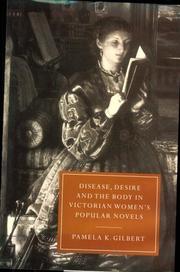
ISBN: 0511585411 0511005202 9780511005206 0521593239 9780511585418 9780521022071 9780521593236 052102207X Year: 1997 Volume: 11 Publisher: Cambridge Cambridge University Press
Abstract | Keywords | Export | Availability | Bookmark
 Loading...
Loading...Choose an application
- Reference Manager
- EndNote
- RefWorks (Direct export to RefWorks)
Popular fiction in mid-Victorian Britain was regarded as both feminine and diseased. Critical articles of the time on fiction and on the body and disease offer convincing evidence that reading was metaphorically allied with eating, contagion and sex. Anxious critics traced the infection of the imperial, healthy body of masculine elite culture by 'diseased' popular fiction, especially novels by women. This book discusses works by three novelists - M. E. Braddon, Rhoda Broughton, and 'Ouida' - within this historical context. In each case, the comparison of an early, 'sensation' novel against a later work shows how generic categorization worked in the context of social concerns to contain anxiety and limit interpretive possibilities. Within the texts themselves, references to contemporary critical and medical literatures resist or exploit mid-Victorian concepts of health, nationality, class and the body.
English fiction --- Women --- Diseases and literature --- Literature and society --- Women and literature --- Popular literature --- Medical fiction --- Sensationalism in literature. --- Human body in literature. --- Diseases in literature. --- Desire in literature. --- Body, Human, in literature --- Human figure in literature --- Literature and diseases --- Literature --- History and criticism. --- Books and reading --- History --- Women authors --- 19th century --- History and criticism --- Great Britain --- Diseases in literature --- Sensationalism in literature --- Body [Human ] in literature --- Arts and Humanities --- Human body in literature
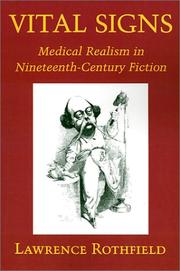
ISBN: 1400813220 1282751565 9786612751561 1400820685 9781400820689 9781400813223 0691068968 0691029547 9780691029542 9781282751569 6612751568 140081782X 9780691068961 Year: 1992 Publisher: Princeton, N.J. Princeton University Press
Abstract | Keywords | Export | Availability | Bookmark
 Loading...
Loading...Choose an application
- Reference Manager
- EndNote
- RefWorks (Direct export to RefWorks)
Vital Signs offers both a compelling reinterpretation of the nineteenth-century novel and a methodological challenge to literary historians. Rejecting theories that equate realism with representation, Lawrence Rothfield argues that literary history forms a subset of the history of discourses and their attendant practices. He shows how clinical medicine provided Balzac, Flaubert, Eliot, and others with narrative strategies, epistemological assumptions, and models of professional authority. He also traces the linkages between medicine's eventual decline in scientific and social status and realism's displacement by naturalism, detective fiction, and modernism.
Realism in literature. --- Physicians in literature. --- Medical fiction --- Comparative literature --- Literature and medicine --- French fiction --- Medicine in literature. --- English fiction --- Neorealism (Literature) --- Magic realism (Literature) --- Mimesis in literature --- Medical care in literature --- Medicine and literature --- Medicine --- History and criticism. --- French and English. --- English and French. --- History --- Medicine in literature --- Physicians in literature --- Realism in literature --- 82.091 --- 82-31 "18" --- 82.091 Vergelijkende literatuurstudie --- Vergelijkende literatuurstudie --- 82-31 "18" Roman--19e eeuw. Periode 1800-1899 --- Roman--19e eeuw. Periode 1800-1899 --- English and French --- French and English --- History and criticism --- English language --- French language --- Thematology --- anno 1800-1899
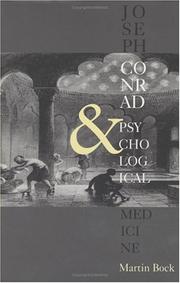
ISBN: 1281093270 9786611093273 1423766164 9781423766162 9781281093271 0896724832 9780896724839 6611093273 Year: 2002 Publisher: Lubbock, Tex. Texas Tech University Press
Abstract | Keywords | Export | Availability | Bookmark
 Loading...
Loading...Choose an application
- Reference Manager
- EndNote
- RefWorks (Direct export to RefWorks)
Psychological fiction, English --- Novelists, English --- Psychology in literature. --- Medical fiction --- Medicine in Literature. --- Psychology --- Psychology in literature --- Medicine in Literature --- Literature --- Behavioral Sciences --- Humanities --- Behavioral Disciplines and Activities --- Psychiatry and Psychology --- English Literature --- English --- Languages & Literatures --- Literatures --- Factors, Psychological --- Psychological Factors --- Psychological Side Effects --- Psychologists --- Psychosocial Factors --- Side Effects, Psychological --- Factor, Psychological --- Factor, Psychosocial --- Factors, Psychosocial --- Psychological Factor --- Psychological Side Effect --- Psychologist --- Psychosocial Factor --- Side Effect, Psychological --- Literature, Medicine in --- in Literature, Medicine --- Psychology as a theme in literature --- English novelists --- English psychological fiction --- English fiction --- Proxemics --- Behavioral Science --- Proxemic --- Science, Behavioral --- Sciences, Behavioral --- History and criticism. --- Psychology. --- History. --- History and criticism --- Conrad, Joseph, --- Korzeniowski, Józef Konrad Teodor, --- Korzeniowski, Joseph Conrad Theodore, --- Konrad, Dzhozef, --- Kʻang-la-te, --- Conrad-Korzeniowski, Joseph, --- Korzeniowski, Joseph Conrad-, --- Kʻonradŭ, Josep, --- Kʻonradŭ, Chosep, --- Kʻolladŭ, Josep, --- Konrad, Dzd. --- Conrad, Józef, --- קונראד, ג׳וזף, --- קונראד, ג׳וסף --- קונרד, ג׳וזף --- קונרד, ג׳וזף, --- קונרד, יוסף --- 康拉德, --- Konrad Nalecz Korzeniowsky, Jozef Tedor, --- Konrant, Tzozeph, --- Knowledge --- Psychiatry
Book
ISBN: 3319042521 331904253X Year: 2014 Publisher: Cham : Springer International Publishing : Imprint: Springer,
Abstract | Keywords | Export | Availability | Bookmark
 Loading...
Loading...Choose an application
- Reference Manager
- EndNote
- RefWorks (Direct export to RefWorks)
Like many fields of science, the future of medicine is frequently predicted by the science fiction writers of today, very much as many of today’s medical advances were presaged by science fiction stories of the past. In this book, physician and science fiction author Brad Aiken conveys his own speculations about our medical future through nine highly entertaining and thought-provoking short stories. Touching upon a great variety of themes, including but not limited to telemedicine and remote surgery, vaccination strategies against unknown deathly pathogens, nanomedicine to cure diseases and retard ageing, bionics, cloning and euthanasia, we get a glimpse of what might be awaiting humanity. Yet, in these stories it is always the protagonists, humans after all, who remain at the center stage, not the new technologies. This provides the fictional material with a unique blend of science fiction and social fantasy. It also warns us to be wary of the pitfalls of too much reliance on dehumanizing technology and to make sure it remains our helper, not our master. Last but not least, an extensive scientific essay investigates the interplay between science fiction and both past and current advances in medical sciences and technology, making the link to the fictional material in the book as well as to the relevant scientific literature. Brad Aiken is the Medical Director for Rehabilitation at Baptist Hospital in Miami, Florida. He has published several scientific articles, and has presented to both professional and non-professional groups on a variety of topics. Dr. Aiken has received numerous science awards, including the Navy Science Award, as well as awards from the Army, the Air Force and NASA. He began writing science fiction while in college at Boston University, and published his first book, Starscape: The Silver Bullet, in 2000. His latest book, Zone of the Tenth Degree, was published in August 2012. His short stories have appeared in Analog Science Fiction and Fact, Padwolf Presents, and the vampire anthology New Blood.
Medical fiction. --- Science fiction, American. --- Hospital fiction --- Hospitals --- Medical care --- Medicine --- American science fiction --- Medicine. --- Health informatics. --- Medical research. --- Cell biology. --- Health. --- Quality of life. --- Biomaterials. --- Medicine & Public Health. --- Medicine/Public Health, general. --- Popular Science in Medicine and Health. --- Cell Biology. --- Quality of Life Research. --- Health Informatics. --- Fiction --- American fiction --- Cytology. --- Quality of Life --- Medical records --- Research. --- Data processing. --- Biocompatible materials --- Biomaterials --- Medical materials --- Biomedical engineering --- Materials --- Biocompatibility --- Prosthesis --- EHR systems --- EHR technology --- EHRs (Electronic health records) --- Electronic health records --- Electronic medical records --- EMR systems --- EMRs (Electronic medical records) --- Information storage and retrieval systems --- Life, Quality of --- Economic history --- Human ecology --- Life --- Social history --- Basic needs --- Human comfort --- Social accounting --- Work-life balance --- Cell biology --- Cellular biology --- Biology --- Cells --- Cytologists --- Clinical sciences --- Medical profession --- Human biology --- Life sciences --- Medical sciences --- Pathology --- Physicians --- Health Workforce --- Medicine . --- Bioartificial materials --- Hemocompatible materials --- Clinical informatics --- Health informatics --- Medical information science --- Information science --- Biomedical research --- Medical research --- Personal health --- Wellness --- Physiology --- Diseases --- Holistic medicine --- Hygiene --- Well-being --- Data processing --- Biomaterials (Biomedical materials)
| Listing 1 - 7 of 7 |
Sort by
|

 Search
Search Feedback
Feedback About UniCat
About UniCat  Help
Help News
News